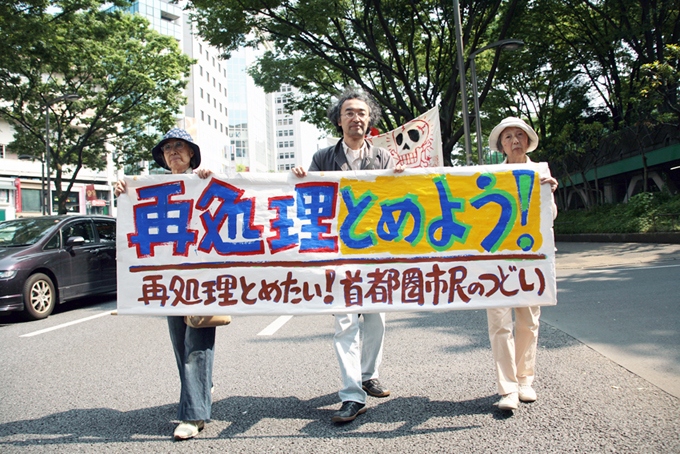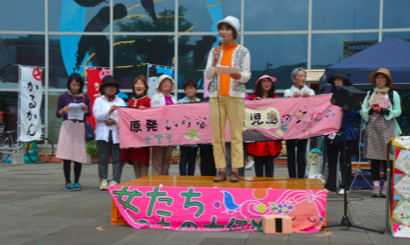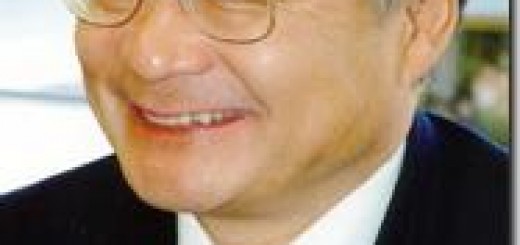Anti-Nuke Who’s Who Yasuko Yamaguchi, Former delegate of the Women’s Democratic Club Nuke Info Tokyo No. 156
From the elimination of synthetic detergent to the anti-nuclear power movement – fighting against dangerous causes that threaten our lives
by TOMIYAMA Yoko*
 |
| Appeal for the abolition of the reprocessing of spent nuclear fuels Ms. Yamaguchi is on the right and the author, Ms. Tomiyama, is on the left. |
The first time I became acquainted with the name Yasuko Yamaguchi was at the beginning of the 1970s. I remember that it was at a consumers conference, when she was bringing the dangers of synthetic detergents to the attention of the participants from the floor of the big assembly hall. Listening to her well-composed and persuasive speech, I became deeply aware of the fact that I had a lot to learn from this great senior activist.
When Ms. Yamaguchi was married in 1952 and started her life in Asagaya in Tokyo’s Suginami Ward, she learned about the “Women’s Democratic Journal” (now the “Femin Women’s Democratic Journal”). Seeing this as an opportunity, she joined Asagaya’s “Women’s Democratic Club” (now the “Femin Women’s Democratic Club”).
Before long, Ms. Yamaguchi gave birth to a child. At the same time, Kaoru Yasui, director of the Suginami Ward Community Center, started a petition for the abolition of nuclear weapons. Ms. Yamaguchi, with her child in a baby carriage, went to meetings of the Community Center, collected signatures and actively took part in the campaign. The signature campaign gained momentum and expanded nationwide when in 1954 the Japanese fishing boat Daigo Fukuryū Maru was exposed to and contaminated by nuclear fallout from H-bomb tests in the Bikini Atoll. Subsequently, Suginami became known as the birthplace of the movement to ban the atomic and hydrogen bombs.
When Japan lost the war, Ms. Yamaguchi was a 4th year student at a girls’ high school. With the post-war reform of the school system, she became a 2nd year high school student. She explains: “What happened was that the general worker’s strikes were suspended under orders from General MacArthur. I cannot forget how one of our high school teachers, who was the chairman of the teacher’s union, stood lamenting in front of the whole school. I also became familiar with magazines such as “Sekai” (“The World”) brought home by my older brother, who was a university student at that time, and for some reason started taking an interest in social issues.”
The Women’s Democratic Club, founded in 1946, cherishes democratic values, aims for a war-free society and shares the idea and a way of living that “each individual should pursue what they want to do.” Ms. Yamaguchi became especially concerned with environmental problems that affected people’s everyday lives, such as the elimination of synthetic detergents and pesticides, and also actively joined the anti-nuclear power movement. These kinds of topics are also connected to peace and women’s issues. Ms. Yamaguchi emphasizes that the source of her motivation has been that she wanted to fight one-by-one the dangerous causes which threaten our lives. Today she is playing an active role in the secretariat of the “10 Million People’s Action to say Goodbye to Nuclear Power Plants”.
I will do my best to put myself in the place of those whose lives have been driven into disadvantageous positions, and with my head held high, will continue to walk down the path laid down by Yasuko Yamaguchi and her fellow leaders.
* Former representative of the administration committee of the Consumers Union of Japan


